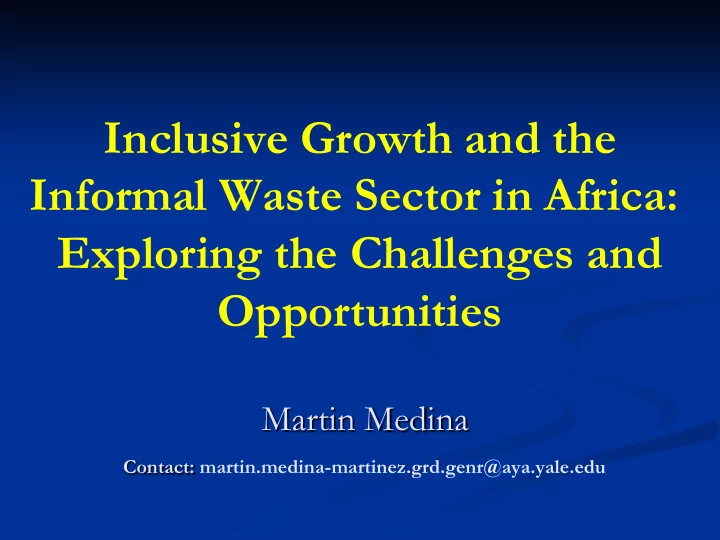

Inclusive Growth and the Informal Waste Sector in Africa: Exploring the Challenges and Opportunities Martin Medina Contact: martin.medina-martinez.grd.genr@aya.yale.edu
Waste Management in Africa One of the Most Pressing Urban Environmental Problems Neglected in Sub-Saharan Africa North – South “Continental Divide”
Projected Changes in Urban and Rural Populations by Region for 2050 (millions)
Waste Collection and Disposal by Income Levels Waste Collection Proper Disposal Low-Income 40 % 5 % Countries Middle-Income 60 % 30 % Countries High-Income 100 % 100 % Countries
Waste Collection by Region Region Waste Collection OECD 97 % MENA Countries 85 % LAC Countries 78 % Europe and Central Asia 78 % East Asia and Pacific 78 % South Asia 64 % Sub-Saharan Africa 45 %
Projections of Urban Population and Waste Generation in Sub-Saharan Africa (population in millions; waste in ‘000s of tons/day)
Main Problems Air, Water, and Land Pollution and Pose Risks to Human Health and the Environment Many Cities Unable to Provide Adequate Waste Management Services Inappropriate Technologies Worsening Trend in the Near Future
Freetown, Sierra Leone
The Informal Waste Sector (IWS) 1% of the Urban Population: up to 15 Million Worldwide (2.5 million in Africa), with an Economic Impact of US $ Billions Traditionally Poor, Ignored, Exploited, or Repressed
The Informal Waste Sector Scavengers Informal Waste Collectors Manufacturing with Waste Materials Provision of Services
Informal Waste Sector Workers Vulnerable segment of the Population: * Recent migrants * Unemployed * Widows * Disabled * Elderly * Children
When the IWS is Supported: Create Jobs Reduce Poverty Supply Inexpensive Materials to Industry Reduce Pollution
When the IWS is Supported: Conserve Natural Resources Save Cities in Waste Collection and Disposal Reduce Greenhouse Gas Emissions
And Yet… IWS Activities are Illegal in Most African Countries No Government Policies / Programs Linking IWS, Poverty, Waste Management and Green Growth
The African IWS Grassroots Efforts to Make a Living and Satisfy a Social Need Entrepreneurial Activity Invest Their Own Resources Appropriate Technologies
Lagos, Nigeria
Lagos, Nigeria
Nairobi, Kenya
The IWS in South Africa Scavengers Popularly Known as Salvagers or Reclaimers Traditionally Black (Before / After Apartheid) Despite Black Economic Empowerment, They Have Been Ignored Many Cities Selling the Right to Recover Recyclables to Private Companies
The IWS in South Africa 1) Msunduzi Municipality Repression: Reduction of 80% in Income 2) Metsimaholo Municipality Scavenging Allowed, but Forced to Sell Materials to a Black Economic Empowerment Company 3) Emfuleni Municipality Trying to Incorporate the IWS, but not Part of the Decision Process
The IWS in Tunisia ECO-Lef Program: 1997 National Program for Recovery and Recycling of Post-Consumer Packaging Initially Signed Contracts with 2 Private Companies Residents Could Deposit Their Packaging in 470 Bins Throughout the Country
The IWS in Tunisia Collection Depots Purchase Materials by the Kg. Over 300 Throughout the Country Income Opportunities for ›11,000 Poor Individuals Formed 2,000 Micro-enterprises The IWS Increased Volume and Reduced Collection Costs
The IWS in Tunisia
The IWS in Egypt Cairo’s IWS Manages about 60% of the city’s Wastes The IWS Recycles 80% of Each Ton of Wastes They Collect, One of the Highest Recycling Rates in the World Government Never Supportive
The IWS in Egypt In 2002 Government Awarded Contracts to Private Companies for Waste Collection In 2009 it Admitted that Service Had Deteriorated in that Period Also in 2009, the Government Ordered all Pigs Killed due to Swine Flu Fears (no cases in Egypt) Today Organic Waste Accumulates on the Streets
The IWS in Egypt: Waste Collection
The IWS in Egypt: Recycling
The IWS in Egypt: Manufacturing
IWS Income in Selected Cities
The IWS in Asia and LA Legal Recognition and National Programs in Brazil, Colombia, India, Indonesia, Philippines Grassroots Efforts to Get Organized and for Their Social Inclusion More Advanced in LA The World Bank and IADB Now Work with the IWS
The IWS in Latin America: Co-operatives 1,000 Cooperatives in South America In Brazil, Scavengers Organized a National Movement, with 500 Cooperatives and 60,000 Members
National Movement of Catadores
National March in Brasilia
“Grito dos Excluidos” in Brazil
“Grito dos Excluidos” in Brazil
Educational Campaign
Meeting with President Lula da Silva
The IWS in Latin America National Movements in Argentina, Colombia, Brazil, Chile, and Uruguay In process in India and Paraguay Latin American Network Created in 2005
Public-Private Partnerships With the IWS: Colombia
Public-Private Partnerships With the IWS: Colombia
Housing Units for IWS Workers in Bogotá
Conclusions Africa Will Face Significant Challenges in Waste Management in the Coming Decades IWS Activities Render Social, Economic, and Environmental Benefits The IWS can be Part of the Solution, but Its Development Potential is not Harnessed Africa can Learn from Asia and Latin America
More in my book:
Recommend
More recommend